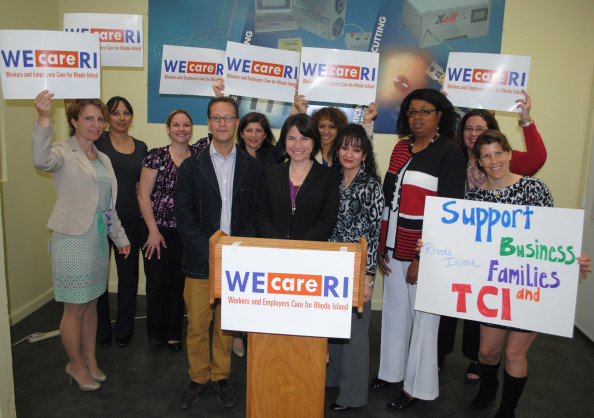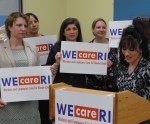As President of LNA Laser Technology in Pawtucket, Rhode Island, Dan Gold knows the importance of attracting and retaining highly skilled workers to his state. That’s why he hosted a press event at his company this week to support the Temporary Caregiver Insurance (TCI) bill that would ensure workers can earn replacement income for up to eight weeks when they need time to care for a seriously ill family member or a new child.
“Recruiting, hiring and training new employees is too expensive and time consuming,” Gold said, “especially when under TCI I know that my employees will return after they’re done with their caregiving responsibilities. This bill not only provides employees with job security, but business owners are able to avoid the costly process of hiring and training new employees.” Noting that TCI is entirely funded by employees, Gold called it “a win-win for everybody.”
Joining him were other business owners, workers and healthcare and family advocates, all calling on the state legislature to pass TCI (S 231 and H 5889). Sponsored by Senator Gayle Goldin and Representative Elaine Coderre, the bill will make sure families are not forced into financial crisis after a serious illness or arrival of a new child, and will provide support to small business owners.
The press conference was organized by We Care RI, a broad and diverse coalition of 24 Rhode Island businesses and organizations advocating for employers, workers, families and seniors.
TCI would build off of Rhode Island’s existing Temporary Disability Insurance program and expand this financial security to family members who need to take time off to care for a severely ill family member.
Tammy Russo from Coventry, RI, described the situation last fall when her son, Joey, 20, who has severe cognitive and physical disabilities, was hospitalized for 17 days. During that time, he had many medical procedures, including two major brain surgeries,
“The financial strain was substantial,” she said. “I became very worried about how we would pay for all of our bills and still allow my son to receive care from the ones who know his needs the best—my husband and me. Had TCI been in place then, I would not have worried if my family could pay the mortgage, utilities, insurances, and food during my time away from work and my paycheck. I would have had the replacement income that I contribute into each paycheck.”
Senate sponsor Gayle Goldin noted that “too many hard working Rhode Islanders, like Tammy Russo, find themselves on the edge of economic crisis when they need to care for a seriously ill family member or welcome a new child into their home. Life is filled with unexpected events, and all of us have experienced the push-pull between work responsibilities and someone in our families needing us. Temporary Caregiver Insurance is a cost-effective way to give employees the time to balance family and work responsibilities without jeopardizing their economic security.”
Senator Goldin characterized TCI as “a critical investment in our workforce and our families that is good for Rhode Island’s businesses and the overall economy.”
Two other states, California and New Jersey, have implemented paid family leave programs, and studies have shown that they save employers money. A 2011 study of California’s family leave program estimated that family leave insurance saves employers $89 million a year by improving employee retention and reducing turnover costs. An overwhelming majority of employers in California report that paid family leave has had a positive or neutral effect on their productivity, profitability and performance. A recent Rutgers study of the paid family leave program in New Jersey shows that family leave insurance leads to business savings by improving employee retention, decreasing turnover costs, and enhancing worker morale.
While TCI would cover nearly 80 percent of Rhode Island’s workforce, low-wage workers living from paycheck to paycheck stand to benefit the most. Low-wage workers are the least likely to have a full-range of benefits or the savings to cover a few weeks of missed work. Yet, for less than cost of a cup of coffee a day, a low-wage worker can have the peace of mind to know that he or she can access to paid time off when the need is greatest.
For more, check out the video at wecareri.org.

